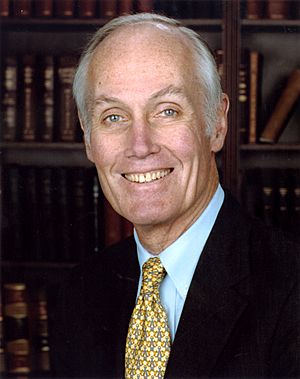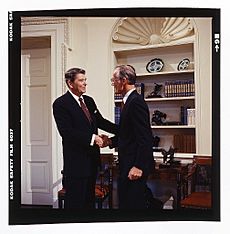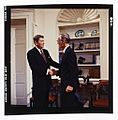Slade Gorton facts for kids
Quick facts for kids
Slade Gorton
|
|
|---|---|
 |
|
| United States Senator from Washington |
|
| In office January 3, 1989 – January 3, 2001 |
|
| Preceded by | Daniel J. Evans |
| Succeeded by | Maria Cantwell |
| In office January 3, 1981 – January 3, 1987 |
|
| Preceded by | Warren Magnuson |
| Succeeded by | Brock Adams |
| 14th Attorney General of Washington | |
| In office January 15, 1969 – January 1, 1981 |
|
| Governor | Daniel J. Evans Dixy Lee Ray |
| Preceded by | John O'Connell |
| Succeeded by | Ken Eikenberry |
| Majority Leader of the Washington House of Representatives | |
| In office January 9, 1967 – January 13, 1969 |
|
| Preceded by | John L. O'Brien |
| Succeeded by | Stewart Bledsoe |
| Member of the Washington House of Representatives from the 46th district |
|
| In office January 12, 1959 – January 13, 1969 |
|
| Preceded by | Alfred E. Leland |
| Succeeded by | George W. Scott |
| Personal details | |
| Born |
Thomas Slade Gorton III
January 8, 1928 Chicago, Illinois, U.S. |
| Died | August 19, 2020 (aged 92) Clyde Hill, Washington, U.S. |
| Political party | Republican |
| Spouse |
Sally Clark
(m. 1958; died 2013) |
| Children | 3 |
| Relatives | Nathaniel M. Gorton (brother) |
| Education | Dartmouth College (BA) Columbia University (JD) |
| Military service | |
| Allegiance | |
| Branch/service | |
| Years of service | 1945–1946 (Army) 1953–1956 (Air Force) 1956–1980 (Reserve) |
| Rank | Colonel |
| Unit | United States Air Force Reserve |
Thomas Slade Gorton III (born January 8, 1928 – died August 19, 2020) was an American lawyer and politician. He served as a U.S. Senator for the state of Washington. He was a member of the Republican Party. Slade Gorton was a senator from 1981 to 1987, and again from 1989 to 2001.
He held both of Washington's U.S. Senate seats during his career. He lost his re-election bids twice by a small number of votes. First, in 1986, he was defeated by Brock Adams. Then, in 2000, he lost to Maria Cantwell after a recount.
| Top - 0-9 A B C D E F G H I J K L M N O P Q R S T U V W X Y Z |
Early Life and Education
Slade Gorton was born in Chicago, Illinois, on January 8, 1928. He grew up in the nearby town of Evanston. His father, Thomas Slade Gorton, Jr., founded a fish supply company. Slade Gorton's family had a history in the fishing business. His younger brother, Nathaniel M. Gorton, became a judge.
Gorton went to Dartmouth College and then to Columbia Law School. He also served in the military. He was in the United States Army from 1945 to 1946. Later, he joined the United States Air Force from 1953 to 1956. He continued to serve in the Air Force Reserve Command until 1980. He retired from the military as a Colonel.
Early Career in Politics
Gorton started his career as a lawyer. In 1958, he entered politics. He was elected to the Washington House of Representatives. He served there from 1959 to 1969. During this time, he became one of the most important members of the House.
After that, he became the Attorney General of Washington. He held this position from 1969 until 1981. As Attorney General, Gorton was known for personally arguing cases for the state. He often won these cases before the Supreme Court of the United States.
Helping Seattle Sports Teams
In 1970, Attorney General Gorton took action against Major League Baseball. This happened after the Seattle Pilots baseball team moved to Milwaukee. He sued the league to try and keep a team in Seattle. Eventually, the league agreed to create a new team for Seattle. This team became the Seattle Mariners, who started playing in 1977.
Years later, Gorton helped the Mariners again. The team was at risk of moving away from Seattle. He talked to the leaders of Nintendo of America, Minoru Arakawa and Howard Lincoln. Nintendo's president, Hiroshi Yamauchi, agreed to buy a large part of the team. This kept the Mariners in Seattle. Gorton also helped make a deal for the Mariners' stadium, which is now called T-Mobile Park.
U.S. Senate Campaigns
First Election to the Senate (1980)
In 1980, Slade Gorton ran for the U.S. Senate. He won against Warren Magnuson, who had been a senator for a long time. Gorton won with 54% of the votes.
Re-election Bid (1986)
In 1986, Gorton tried to get re-elected. However, he was narrowly defeated by Brock Adams. Adams was a former Congressman and had served as the Secretary of Transportation.
Winning a Different Senate Seat (1988)
In 1988, Gorton ran for Washington's other Senate seat. This seat was open because his political friend, Dan Evans, was leaving. Gorton won this election. He defeated Congressman Mike Lowry by a small margin.
In the Senate, Gorton was known for having views that were between moderate and conservative. He was a very important member of the U.S. Senate Armed Services Committee. This was because he was the only member who had reached a high rank in the military (Air Force).
Another Re-election (1994)
In 1994, Gorton ran for re-election again. He won against Ron Sims, who was a local councilman at the time. Gorton received 56% of the votes.
Final Senate Election (2000)
In 2000, Gorton ran for re-election one last time. He was challenged by Democrat Maria Cantwell. Cantwell won the election by only 2,229 votes. This was out of almost 2.5 million votes cast.
Many Native American tribes in Washington strongly opposed Gorton in 2000. This was because he often tried to change laws related to tribal sovereignty.
Later Career and Public Service
After leaving the Senate, Gorton continued to be involved in public service.
The 9/11 Commission
In 2002, Gorton became a member of the National Commission on Terrorist Attacks Upon the United States. This group is also known as the "9/11 Commission." Their job was to investigate the September 11, 2001, attacks. The commission released its final report in 2004.
Supporting Washington State Courts
In 2005, Gorton became the chairman of the Constitutional Law PAC. This group helps elect judges to the Washington State Supreme Court and the Court of Appeals.
National Security and Foreign Policy
Gorton was also an advisor for the Partnership for a Secure America. This group works to find common ground between political parties on national security and foreign policy. He also served as a Senior Fellow at the Bipartisan Policy Center.
He was a member of the board of trustees for the National Constitution Center in Philadelphia. This museum teaches people about the U.S. Constitution.
Seattle SuperSonics Lawsuit
Gorton represented the city of Seattle in a lawsuit. The lawsuit was against Clay Bennett, who owned the Seattle SuperSonics basketball team. The city wanted to stop the team from moving to Oklahoma City. Seattle had a contract that would keep the team in KeyArena until 2010. The city and Bennett eventually reached an agreement. This allowed the team to move for $45 million, with a chance for another $30 million.
International Policy and Research
In 2010, the National Bureau of Asian Research created the Slade Gorton International Policy Center. This center focuses on policy research. It also has programs for fellowships and internships. The center also keeps Gorton's historical records. In 2013, Gorton was a commissioner for the 'Commission on The Theft of American Intellectual Property'.
Personal Life and Death
Slade Gorton married Sally Clark Gorton on June 28, 1958. Sally passed away in 2013.
Slade Gorton died on August 19, 2020. He was 92 years old. He passed away after a short illness at his daughter's home in Clyde Hill, near Seattle.
Images for kids
 | John T. Biggers |
 | Thomas Blackshear |
 | Mark Bradford |
 | Beverly Buchanan |




